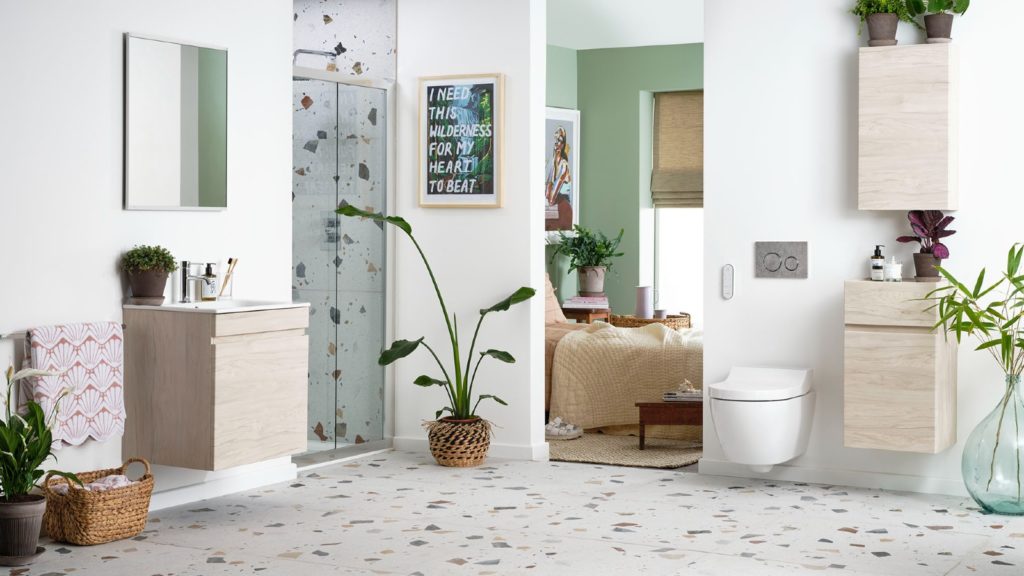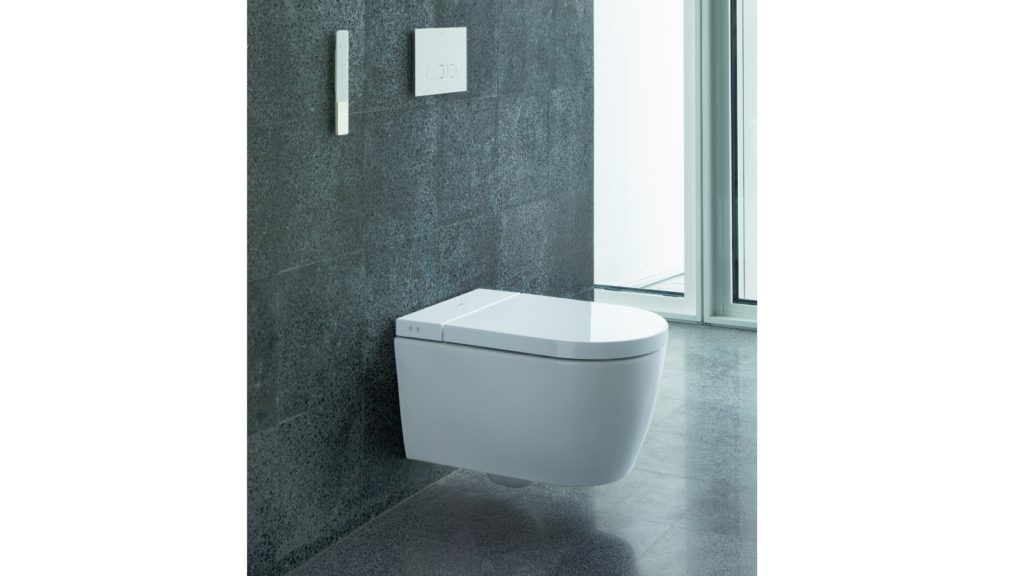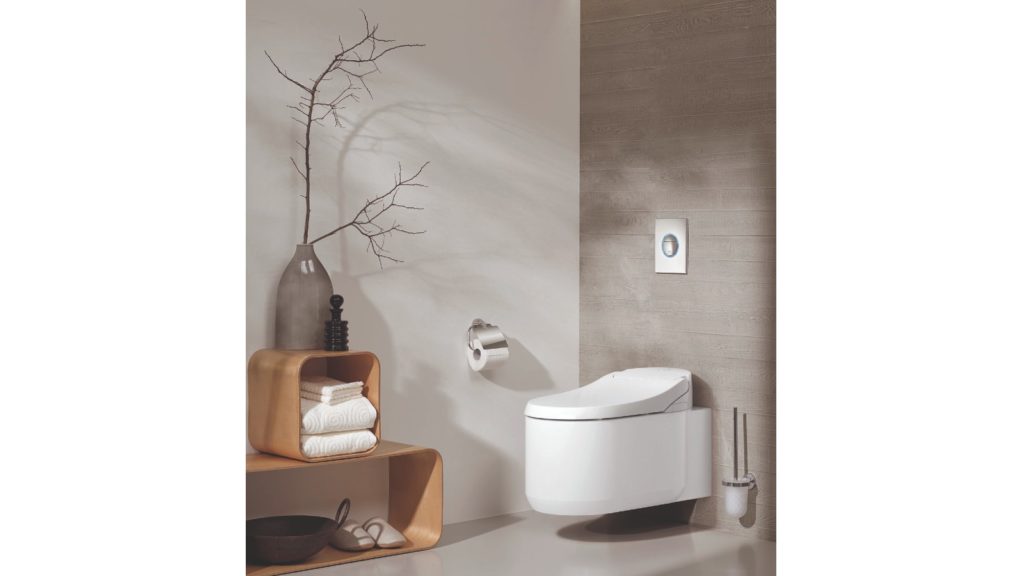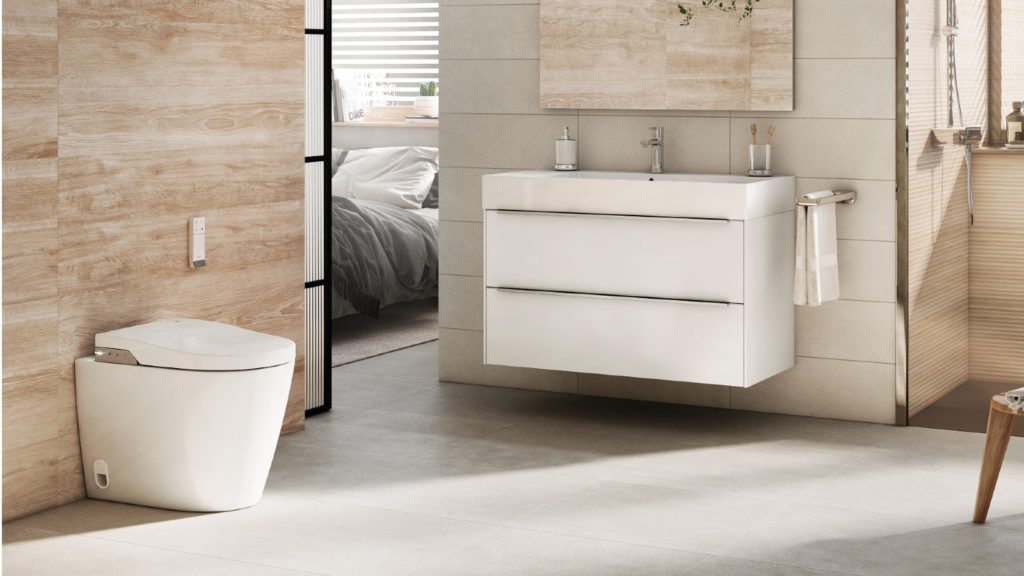We reveal how demand for greater hygiene and future proofing homes has seen a cultural shift towards shower toilet adoption.

The Geberit Aquaclean Tuma Classic is a shower toilet at an “attractive” price level and offers a choice of temperature, spray pressure and position, as well as length of wash programme.
It wasn’t so long ago, in the UK, the shower toilet was viewed as an outlandish extravagance at best or an example of toilet humour at worst.
But there has been escalating step change towards shower toilet acceptance and specification.
Sponsored Video
It could be argued consumers who are more widely travelled to the likes of the Far East – where douches are a standard specification – have become less resistant to the concept and, in fact, embraced the hygiene benefits.
In fact, using Google search technology interior design platform homeedit recently revealed the shower toilet was now the third most desirable tech in 2021 with 29,180 searches.
In fact, it was only outranked by bathroom TVs (36,170 searches) and LED mirrors (73,400 searches).
Marketing manager of Geberit Sophie Weston comments on their growth of popularity: “More people than ever before are opting to include a WC with integrated spray function into their bathroom.
“We have seen a real cultural shift towards the realisation that water is essential for thorough cleanliness for thorough cleanliness and optimal hygiene.”
Focus on hygiene
Unsurprisingly, hygiene is a key trend driving bathroom design and particularly in a post-COVID landscape.

Duravit Starck F is offered in two versions – Starck F Plus and Starck F Lite, both of which are rimless, boast a shower function, hot air and seat dryer and are operated by remote and app controls.
Managing director of Duravit UK Martin Carroll says: “Consumers are now more way of the need to be even more hygienic in the home, and the bathroom is a place where you go to cleanse and refresh yourself more than in any other room in the house.”
And Sophie Weston of Geberit agrees: “Naturally, we have all become more concerned with our personal hygiene.
“Aside from the obvious – this increased awareness of cleanliness has also extended to wider areas of personal hygiene, with the shower toilet fast becoming the most sought-after bathroom innovation in the UK.”
Ease of use
Technology in shower toilets, such as cleaning by water and drying functions, also supports mega trends such as a growing ageing population.

The Grohe Sensia Arena feature motion sensors to automatically open and close the toilet and optional automatic flush functionality. Users can select preferences, spray patterns and store on an app for use on any Grohe Sensia Arena in the world.
Automatic flushing and drying technology can provide independent for older generations and future-proof bathrooms for younger clients who have found their forever home.
While personalised and preferred settings can be programmed and operated by remote control, or even an app, can provide ease of use for all ages.
Leader category UK of Lixil EMENA and Grohe UK Elina Enqvist-Twomey offers the example: “The Grohe Sensia Arena is equipped with automatic flush functionality (an optional extra that can be purchased separately) and precise motion sensors, which prompt the lid to open automatically, open upon approaching and close when you leave, helping to improve both hygiene and ease of use, allowing individuals of all ages and capabilities to use the bathroom independently.”
Tech for all
Cutting-edge technology can of course command higher price tags, which may have previously limited sales.

The In-Wash Nova, from Roca, features an integrated spray nozzle that cleans itself after each use, a presence sensor to ensure washing or cleaning is not operated by accident, LED light and on-toilet as well as remote controls.
However, for bathroom retailers who may not have high net worth clientele, there are shower toilets for a variety of budgets. Sophie Weston agrees, stating: “Previously, there many have been a perception that shower toilets were only available to more premium renovation projects, yet there are a wide range of makes and models now on offer.”
She exclaims the Geberit Aquaclean is available in three models to provide a choice of price points.
Duravit has also introduced the Starck F which offers shower toilet functionality at an “affordable” price level.
While Grohe points out its state-of-the art smart toilet is its most popular model, it also offers retrofit options, with theGrohe Bau Manual Bidet seat which can be added to existing toilets and is water powered rather than electrically operated.
Elina Enqvist-Twomey explains it “opens up the smart toilet market to many and offers a more accessible option to those with smaller budgets and those requiring a shower toilet solution without wanting to carry out invasive work.”
Growing UK sales
Certainly, the expectations are that shower toilet sales will continue to grow for bathroom retailers, supported by the demand for hygiene and future proofing homes.
Martin Carroll of Duravit comments: “Sales of shower toilets are only going to increase over the next two years as consumers adapt to a changing world and heightened awareness of hygiene, coupled with embracing technology in the home more and more.”
And Enqvist-Twomey agrees, concluding: “We expect that more and more homes will begin to future-proof their bathrooms with shower toilets in the next few years, particularly as their associated hygiene benefits begin to be more widely understood.
“We have seen an unprecedented demand for our shower toilets and other sensor-activated product such as touchless taps in the wake of the coronavirus crisis and we predict that hygiene will remain at the forefront of our minds both in the near future and more long-term.”



